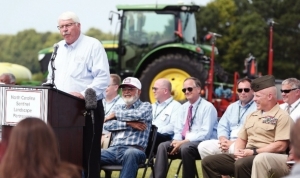Troxler visits Cherry Farm to announce designation
By Steve Herring
Published in News on July 13, 2016 1:46 PM

News-Argus/CASEY MOZINGO
N.C. Agriculture Commissioner Steve Troxler speaks to a group of people representing agriculture, the military and the community during a Sentinel Landscape presentation Tuesday at Cherry Research Farm.

News-Argus/CASEY MOZINGO
N.C. Agriculture Commissioner Steve Troxler welcomes Brig. Gen. Thomas Weidley from U.S. Marine Corps Base Camp Lejeune to the podium during the North Carolina Sentinel Landscape Partnership presentation Tuesday morning at the Cherry Research Farm.
Eastern North Carolina, home to a rich agricultural history and multiple key military installations and ranges, Tuesday morning received federal designation as the Eastern North Carolina Sentinel Landscape designed to protect the state's top two economic engines.
"It means that we will have another tool in our toolbox to protect working lands (farms) and our natural resources in the areas around our military bases," said North Carolina Agriculture Commissioner Steve Troxler in making the announcement. "We are one of three designations announced this morning and the largest designation to date."
The others were in Florida and Minnesota, he said.
"What we are saying to the landowner is from the military side is that we really like you as a neighbor," Troxler told the News-Argus. "The farm and the forest are great for us, and we want to help you stay on that farm and hold that farmland as opposed to selling it for development.
"Our mission right now with the military is to protect these bases. We, in North Carolina, could not afford to lose military bases -- $66 billion in economic impact. So they are right behind agriculture in impact. We want both to remain strong."
Troxler made the announcement on a sprawling Cherry Research Farm cow pasture with a howitzer, an armored vehicle, an explosive ordnance disposal unit truck and robot, a Forestry Service bulldozer and a farm tractor providing the backdrop.
The pasture was chosen for one simple reason, to symbolize an area not facing the encroaching development that poses a threat to the state's military bases, Troxler said.
Troxler said he is concerned about the loss of farmland and forestland as North Carolina continues to be one of the fast-growing states in the nation.
"This is counter to the resources that we need for agriculture and that our military needs for training troops for whatever fight they are involved in," he said. "This is about planning and protecting our military bases and our farming operations around the state.
"The working lands such as our farms and forests at Seymour Johnson (Air Force Base), Dare (County) Bombing Range, Fort Bragg, Camp Lejeune or the Coast Guard Station at Elizabeth City are vital to training missions that occur at all of these installations. The working lands provide a buffer between neighbors and the training that goes on inside these gates."
The region also is home to Marine Corps Air Stations Cherry Point and New River.
In return for helping protect the military missions, the designation also will help provide a central resource to address development pressures as more money becomes available to landowners and counties and municipal governments for programs and incentives to encourage better use of natural resources, he said.
And it is all voluntary, Troxler said.
"This does not give the military any permission to take land from private landowners for their missions," he said. "It is simply cooperation between the landowners and the military to protect both of their interests."
The designation will include development of voluntary programs of incentives for landowners and local governments who want to participate, he said.
The goal is to strengthen farms, ranches and forests, conserving habitat and natural resources while at the same time protecting vital training grounds for military installations, Troxler said.
In the coming months, conservation programs will be announced as well as expected funding sources.
Agriculture and agribusiness and military-related activity are the state's No. 1 and No. 2 industries respectively.
"The main thing is this brings federal partners together with resources to protect the military bases," Troxler told the News-Argus. "For them it is about encroachment. We want to be proactive. We know if we preserve the farms and the forests around the military bases, it fits right into their (military's) mission.
"We are hopeful there will be federal monies that will start coming into North Carolina. We will be asking the (state) Legislature for some matching money to help do this. It is a great program."
How that money could be used for incentives, as well as possible use of tax breaks are still to be hammered out, he said.
The U.S. Departments of Agriculture, Defense and the Interior launched the Sentinel Landscapes Partnership initiative in 2013 to address top priority encroachment concerns identified by the military, including restrictions related to species conservation and potential development of privately owned agriculture, forest, and open space lands.
Through voluntary programs and incentives, eligible landowners and communities who want to conserve and protect their working lands could receive financial assistance to do so while also protecting the military mission of key installations.
Through the North Carolina Department of Agriculture and Consumer Services, qualifying landowners in the region will also be able to access funding assistance for implementing best management practices for land and water resource management, which will provide additional income for farmers that will help to deter development
According to the Sentinel Landscapes Partnership website, programs at Camp Lejeune and Seymour Johnson AFB will work with federal and state partners to offer voluntary landowner incentives protecting aviation training routes through the promotion of compatible land uses.
A program at Camp Lejeune will create high quality habitat for the red-cockaded woodpecker outside the installation in order to forestall anticipated training restrictions inside the installation's boundary.
Tuesday's announcement was welcome news for state Rep. Jimmy Dixon of Mount Olive, a co-chair of the House Agriculture Committee and chair of the Agriculture and Natural Resources Appropriation Committee and of the Environmental Review Commission.
"It is obvious how much the military means to this part of the state, and particularly to Wayne County and surrounding areas, and it obvious how important agriculture is," Dixon said. "As many reasons we are free nation perhaps all of them added together might not equal the fact that we have been able to feed ourselves."
Dixon said he often asks people in large groups when how long has it been since they worried about whether they would have anything to eat the next night. No hands go up, he said.
"This is a magnificent initiative here," he said. "The various conservation people, the military people, the agriculture community are coming together in order to promote the idea that food, fiber and protection for all of our freedoms and liberties are absolutely essential to the continuation of freedom in the United States of America.
"The important thing, I think, is that this movement has started and many, many, many times the beginning of an initiative is the most important part, and I can tell you that there has never been a friendlier General Assembly to agriculture than the General Assembly of North Carolina at this time."
Dixon said he thinks the designation will complement efforts to protect military installations from encroachment of windmill facilities.
"The No. 1 objective in siting the windmill facilities must be that they do not interfere with military training, and secondly the state must continue to explore ways to protect agricultural land," Dixon said.
